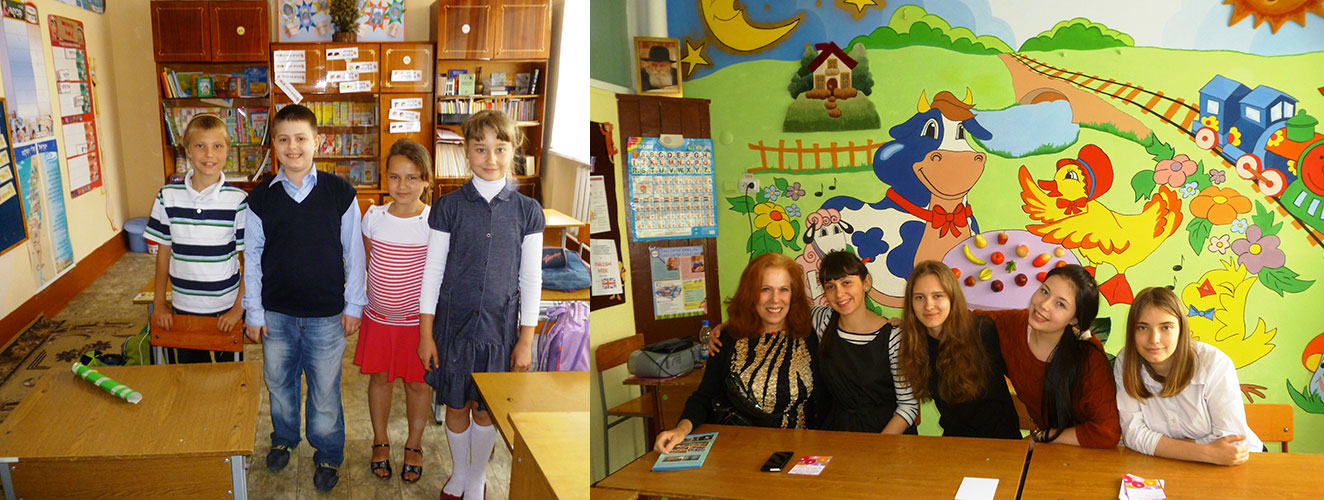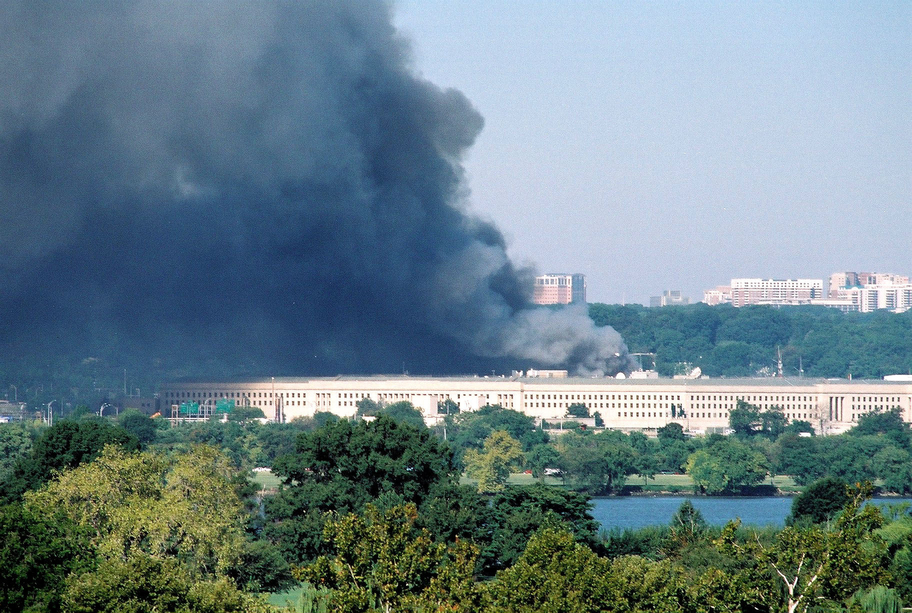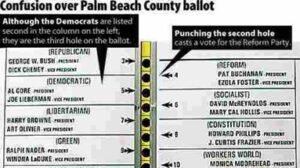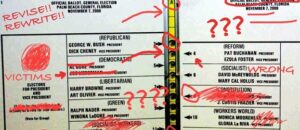REMEMBERING SEPTEMBER 11: View from a Newsroom

Sept. 11, 2001, Washington, D.C.
This Autumn morning was an especially clear and glorious one on Capitol Hill where I was staying with friends while job hunting. Walking toward the Metro, my heavy briefcase brimmed with a portfolio of writing samples and demo reels to show the headhunter who wanted to see them at our 10am meeting.
Weighted down by my life’s work in one valise, I decided to hail a cab at 9:45 to drive me to the meeting downtown. As I got in, I heard the radio blasting: “twin towers collapsing”… airplanes… Pentagon hit.” The driver pointed west across the Potomac where the largest, darkest smoke clouds were gobbling up the sky. We didn’t move, glued to the car radio watching the approaching smoke, trying to comprehend how the Pentagon could be vulnerable to a terrorist attack. “All the money those guys make in the Secret Service,” he said, “and they didn’t know about this attack in advance?”
He took Independence Ave. The closer we inched toward downtown, the more surreal the scene became. As if in slow motion, office workers in suits were milling around the streets trying to get a signal on their cell phones. Crowds of workers thickened near the White House and the Old Executive Office Building. Downtown was grid-locked. People were frantically trying to catch a cab or walk home. Ambulance and police cars, sirens screaming, tried to maneuver around thick traffic.
I couldn’t get a signal on my cell to call the headhunter. Maybe he left work or never came in. Finally I got through to him; we rescheduled. I told the cab driver to take me back up Capitol Hill because with my seven-pound briefcase, I wouldn’t have made it on foot. Bodies started surrounding the cab pounding to get in. Independence Ave. turned into a parking lot. Bumper to bumper in a smoke-clouded vista with the cabby’s running commentary about preparedness for terrorist attacks–the horror of this morning’s events began to sink in.
Back at my friends’ home on Capitol Hill, Muriel and Rob were nervous wrecks trying to reach their children in Manhattan while watching reruns of the twin towers collapsing. Finally a call came through. Everyone’s fine.
I was itching to get to a newsroom or a volunteer center to make myself useful. Knowing Ted Koppel, I called the “Nightline” office and offered to volunteer for anything that may be needed in the newsroom. One senior producer said, “Sure, come on in.” I took the Metro from Capitol Hill to ABC News at 2:00pm. The district was ghostly. The nation’s capital had been evacuated by then.
In the elevator, ABC employees were conferring about the day as it unfolded. One producer said he got a call on his cell in the middle of his morning workout at the gym to get into the bureau immediately. He turned to us as he stepped out of the elevator and said, “This is war, you know.” That’s when it sunk in for me.
“Nightline’s” newsroom was humming with worker bees. A bank of TV monitors lined one wall tuned in to all the major news stations, producers at desks on the phones and in mini-meetings or dashing about, editors cutting overtime, production coordinators passing out updates, timelines and contact lists; and everyone fixated on the bank of monitors. In the background, live updates from ABC pool correspondents on Air Force One or at the Pentagon came in on loudspeakers.
There was nothing for me to do since there would be no “Nightline” broadcast, just continuous live coverage all night anchored by Peter Jennings in New York with some feeds from D.C. The bookers/producers were frantically trying to line up guests to stand by after President Bush’s speech. Either Peter or the producers in N.Y. kept rejecting top-level guests “Nightline” bookers were able to procure. Finally, a few top former government officials were approved and available–Leon Panetta, a former general, etc.
Meanwhile, Ted and his wife were enjoying the first week of their three-week vacation in Italy. That was cut short. Producers got them on a plane to Paris, then Ted onto a charter flight to London and into the ABC bureau there, where he went on live for a few minutes to discuss the European reaction. If planes are allowed to land in the States, his producers will try to get him back to D.C. tomorrow so he can anchor the show.
In the control room, 15 people were frantically coordinating sound, video, reporters and guests on switchboards, aiming for a seamless broadcast. It takes a village–on the phones and at the switches–to pull that off, especially during the biggest national disaster. I stood in the control room like a fly on the wall watching and listening to the news gathering and broadcasting process as the story unfolded and produced live at one of the two nerve centers in the world this day.
At 11:00pm, the Metro was still deserted heading back to the Hill. On a balmy night, walking past a few blocks of row houses I could see through windows people sitting on their couches, their TVs tuned to the horror. The Capital’s streets were deserted but everyone huddled together inside sharing the cool fire broadcast by network news.
From the Northridge earthquake to the L.A. riots, to Florida hurricanes, to the butterfly ballot in Palm Beach County, to the terrorist attack in the nation’s capital…I seem to be in the epicenter of the big ones. Wherever I show up next, pray the city will be prepared.
© Karen Lustgarten, 2001 all rights reserved
BUSH V. GORE: The 20TH Anniversary, My Fault
Background
On December 12, 2000, the Supreme Court ended a Florida vote recount of the uncounted “hanging chads” votes in the presidential election between George W. Bush and Al Gore. It was a close election, even closer in Florida. Whoever won Florida’s Electoral College votes won the Presidency.
Without counting the hanging chads votes, the Florida Secretary of State certified that Bush won Florida by 537 votes. The Florida Supreme Court sided with Gore to count hanging chad votes, enough to decide the winner in Florida. Bush appealed to the U.S. Supreme Court, which ordered the Florida recount halted. Thus, Bush won the Presidency by a Supreme Court decision over counting 537 votes.
Here’s how it went down in Florida and why, 20 years later, I remain personally guilty about the outcome.
The November 2000 Election Debacle
A charming Florida seaside resort city finds itself in the middle of a national voting scandal over who will be the leader of the free world. As a recent resident of Delray Beach, “the village by the sea,” I was sucked into the epicenter of the butterfly ballot fiasco that changed history.
But I was not just an eyewitness to a travesty of Democracy. I actually could have prevented it! Yes, one person really can make a big difference. This time it was me. But I didn’t.
The great differences between the two Presidential candidates led me to volunteer for the local Democratic Party. I signed up to be a poll watcher. Being new to Florida, doing election volunteer work seemed a good way to meet like-minded residents.
At the first volunteer poll watcher meeting, I was handed a packet of information that contained a sample ballot. But because I arrived late (What else is new?), there was no time to open the material at the meeting. Too bad, because a sample cockamamie butterfly ballot lay inside, just waiting for a keen eye and big mouth to speak up about it. During the meeting, if I looked at the ballot would I have raised my hand in objection to its obvious confusion? Or at least questioned it? Probably.
Theresa La Pore, the Palm Beach County Supervisor of Elections, was conducting the meeting and discussing precinct assignments. My assignment was King’s Point, the largest Jewish senior citizen condo development in Delray Beach with more than 2,000 residents, mostly octogenarians. If I had opened the packet of information and reflected on my assignment, would a light bulb have gone off in my head that King’s Point voters would also be scratching their heads in the voting booth trying to figure out this bizarre butterfly ballot format? Probably.
Being new in town, my intent was to combine volunteerism with a need to socialize with colleagues. This assigned precinct of octogenarians wasn’t going to fulfill the latter. An upscale gated community with younger residents was my preference. So when the meeting ended, I requested a precinct change.
On November 6, I received a call from the Democratic Party that my online voter registration did not go through, making me ineligible to vote, thus ineligible to be a poll watcher!
What? So much for trying to register online. I could not be a poll watcher without a voter registration. At this late date–one a day before the election—no volunteer was available to take my place at the King’s Point precinct. I was asked to come to Democratic headquarters instead, located in an empty storefront in a strip mall in Delray Beach on the corner of Lake Ida Road and Congress Ave. There I would obtain a volunteer non-poll watcher assignment.
Election Day, November 7
Headquarters was in chaos when I arrived the morning of Election Day. The banks of phones were screaming off their hooks with callers of all ages hysterical about voting for Pat Buchanan instead of Gore-Lieberman.


“I have a Ph.D.,” cried one caller, “and I couldn’t tell where to punch because the ballot holes didn’t line up on the frame! I think I voted for Buchanan by mistake!”
I took several calls like this, documenting them on hastily mimeographed forms especially created for documenting this political emergency.
Dozens of upset volunteers manning the phones took thousands of calls from deeply distraught voters demanding a re-vote. We all recorded their testimony, one per sheet, and did a little calm-down therapy. Callers needed to vent, to express outrage that their vote may not count or may go to the unintended Buchanan, an offensive, anti-Semitic candidate to them.
I wrote down specific complaints, callers names and phone numbers on the forms. Some were crying, some angry when they thought about their mistaken punch or double punch after leaving the polls. Some said they were refused a duplicate ballot when they realized their punch mistake, even though it is legal to get a second ballot if the original one is not submitted.
By day’s end, phone bank volunteers had filled out thousands of forms documenting callers’ voting mistake complaints. The forms were packed up and sent to national headquarters, I was told. In just one day, the little strip-mall storefront political headquarters unwittingly became a war room fighting for Democracy and voting rights.
After about an hour at headquarters, an organizer had another idea for me.
“We have the phones covered,” she said. “Quick, go to the entrance of the precincts and hand out these warning flyers. Go to this Black church in Boynton Beach and white gated community in Boca-Delray.”
I was instructed to hand a flyer to every driver entering the parking lot. “But only at the entrance to the parking lot as they drive up,” she said, “because it’s against the law to do this any closer to the precinct building.”
The flyers warned voters that the ballot is confusing, especially when the holes are lined up on the frame in the booth. It instructed voters to punch the third hole if they wanted Gore-Lieberman, not the more logical 2nd one.
I took stacks of flyers and drove to a Boynton Beach church. Black volunteers from the neighborhood were spread out along the perimeter of the grounds with the flyers. One toothless, shabby old man had been there since the polls opened and intended to stay the full 12 hours. He said the butterfly ballot design duped his people and he was not going to let Bush win on that count.
He recommended I go to another Black church nearby to see if they needed help. There, too, several volunteers from the neighborhood covered the grounds. They ran out of flyers so they were verbalizing warning instructions to each driver that pulled up. I gave them a stack and headed for the gated community.
There I stood at the parking lot entrance in the hot sun for a few hours feeling a dark cloud over my head. No good-time party feeling here. Something was very wrong with this picture: woman in precinct parking lot on Election Day disseminating ballot warning sheets?
I stopped each car and asked, “Are you planning to vote for Gore-Lieberman today?” If the answer was yes, a flyer was offered.
When I mentioned that their votes might go to Buchanan, the horror that registered on their faces was memorable! Some voters exiting the polls thanked me because they said they could easily have made a punch mistake when the ballot lined up on the frame.
The election hinged on 1,700 votes, the last I heard that day. No problem. The three precincts in my assignment with historically staunch Democratic voters will total many more than that for Gore-Lieberman, so I thought.
Back at storefront headquarters, I learned that voting confusion was rampant at King’s Point! Without a precinct worker available for several hours during the day to give butterfly ballot clarification, most of the 1,500 Democratic votes at King’s point went to Pat Buchanan, a candidate that elderly Jews consider to be a Nazi!
As these voters began to realize their punch on #2 was a vote for Buchanan, they went ballistic according to call records at Democratic headquarters. Many of the elderly King’s Point voters had experienced the Holocaust; all experienced WW II. They cherish democracy and take voting very seriously, always turning out heavily for Presidential elections. This one, especially, is historic because a Jew is on the ballot as Vice-President. They never dreamed it would happen in their lifetime! This election got 99% of King’s Point residents behind Gore-Lieberman.
When he learned that 3,400 votes from the Delray Beach area went to him, even Pat Buchanan admitted to some voting irregularity. “These are not my people,” he stated in a radio interview.
Imagine if I had been stationed at King’s Point, my original poll watcher assignment!
I could have answered ballot questions from confused voters.
I would have given them a duplicate ballot if they tore up the original when they realized they made a punch mistake.
I would have called for legal help if necessary.
I would have saved hundreds, even a thousand of votes meant for Gore-Lieberman!
In the end, Bush won the election by 387 votes. King’s Point alone would have swung that tally into the Gore-Lieberman column handily.
Think about it: Just one poll volunteer assigned to one housing development precinct in one small beach town in Florida could have changed the 2000 election results, and thus a nation’s destiny.
Moral:
Don’t register online.
Don’t change your poll assignment.
One person can make a difference in a Presidential election.
I showed up late for tennis that evening and breathlessly related to Charles, my tennis partner, what I witnessed that day. I described it as an election crisis that could affect the entire state’s results.
“Oh, stop exaggerating,” he said. “Here’s a can of new balls, you serve first.”
The Day After (November 8)
The strip mall storefront and parking lot is ground zero. Inside, the phones are still ringing nonstop with callers demanding a re-vote. Volunteers, including me, are manning the bank of phones, writing down on new forms each caller’s protest about a mistaken vote, one form per caller. This time we are asking each caller to come to headquarters in person and file a formal affidavit, to be certified by a notary, about their mis-punched vote. We also called back all of yesterday’s callers to do the same.
Outside, makeshift card tables are set up with forms for protest voters to sign in front of volunteer notary publics.
They came in droves: Bahamians, Haitians, elderly in wheel chairs, on walkers, on oxygen, with respirators, Baby Boomers, college students. Hundreds and hundreds over the course of the next two days lined up in the hot sun single file on swollen legs to fill out affidavits.
These were not confused old people the media was portraying in the news. These were locals from all walks of life angry about an antiquated ballot system and a flawed ballot design that invalidated their votes for President of the United States. These are voters who refuse to be discarded, stereotyped or ignored in the democratic election process. I was touched by their commitment. We can all take a lesson from them, I thought, because they truly care about democracy. They consider voting their sacred right and they won’t be denied it, no matter how hot the sun or how swollen their legs.
For the first time, I saw the seeds of a grass roots voter protest being sewn in my community. I don’t know where today’s groundswell will lead, but it has begun this day in a parking lot strip mall by a crowd of elderly Jews and Caribbean Blacks righteously protesting a deception in democracy. I am a witness.
By day’s end, the plot thickened. A box of 1,600 ballots was found uncounted in a Gore precinct. The Democratic Party is planning to sue the state of Florida. Grass roots voter rallies are planned tomorrow at the South County Civic Center up the street.
Network news hasn’t been down here to the epicenter of the election debacle. Instead, they’ve been running around in West Palm Beach and other cities. I called Ted Koppel’s assistant and recommended that Nightline send a producer to this Delray Beach headquarters immediately to get the story right and cover tomorrow’s protest rally demanding a re-vote.
Three Days After (Nov. 10)
Today a Nightline producer interviewed several Jewish seniors, Caribbeans and students still lined up waiting to file legal affidavits. FL State Sen. Ron Klein showed up and was interviewed. The video was to be inserted into tonight’s network show, but I didn’t see it at 11:30 p.m.
The sanctioned voter protest rally at the civic center brought out U.S. Rep. Robert Wexler, State Sen. Ron Klein, Commissioner Burt Aaronson and other elected officials who spoke before an angry crowd of several hundred, mostly seniors and Baby Boomers. Sen. Klein called later thanking me for helping to bring a national media outlet together with the local voters to report the truth from the epicenter.
Five Days After (Nov. 12)
Today a newly-formed grass roots organization called The Oral Majority sprung up with a voter protest rally in the streets of Ft. Lauderdale. I went with a girlfriend and discovered it was founded by Kunst, one activist outraged by the final election decision. He said Floridians have been made to look like idiots thanks to Jeb Bush and Katherine Harris. He’s supporting the call for a special prosecutor to investigate the state of Florida.
Protestors from all over South Florida showed up incensed for several reasons:
- They are outraged at the Supreme Court decision.
- They are outraged about uncounted votes.
- They are outraged about stopping Black voters at the polls.
- They are outraged about the butterfly ballot that gave thousands of votes to Buchanan instead of Gore, sparking a re-vote movement.
- And they are angry at TV networks’ bias for Bush throughout the election (Fox and CNN).
Mad as hell, we’re not gonna take it anymore, so we’re takin’ it to the streets.

Internally, we are also upset with the Democratic Party itself because it will not sanction or provide assistance to voters who are offering to voluntarily organize protest marches. Democrats are taking to the streets today without the Party’s support.
I made a sign and held it up: “Hail to the Thief.” Someone changed it to “Heil to the Thief.” Another sign: The sign made: “The Emperors Have no Robes” (Supremes).
One Black man’s sign read, “We Been Robbed”
Another read, “No More Bushit”
We lined a main street with our signs and a rally was formed with about 50 protesters.
A reporter from the Palm Beach Post called to get my opinion of the Supreme Court since its decision. I said that this decision, like the assassination of President Kennedy, marks our loss of innocence. “The Supreme Court’s majority decision killed the innocence of the American people about its most revered branch of government and replaced it with cynicism.”
A few weeks later, the Oral Majority was online with a Website, spearheading a march on Washington. And a national protest movement about the stolen 2000 election was born. I know personally that one person could have made the election difference. Regretfully I discovered how in hindsight.
(c) Karen Lustgarten 2020 all rights reserved
THE L.A. RIOTS
June, 2020– The more things change, the more they stay the same. Twenty-eight years after the L.A. riots, history has repeated a scene caught on tape: police cruelty of a black man. Back then the riot was confined to a section of the city, no protest marches. Today, diverse protest marches reach around the globe. Maybe this time the world outpouring will result in equal justice under the law for real. It didn’t happen in 1992. Here’s how the aftermath went down then, a reflection.
[photo: LA burning]

WHAT DID YOU DO IN THE RIOTS?
The Rodney King Verdict
by Karen Lustgarten
8/19/92, Los Angeles–All across town, markets are running out of food. Tempers are short as lines grow long. It’s a two-hour wait at any check-out stand. There’s panic at the pump–an hour’s wait to fill up. Lines are longer at the ATM machines. Public transportation has been halted. The post office suspended mail delivery. Crowds are forming around the downtown post office; people need their welfare and pay checks now. Sirens are screaming down city streets and helicopters are buzzing overhead. All businesses are closed. Everyone is admonished to stay indoors.
The inner city hit by vandalism is without electricity and phone service. Mom-and-pop businesses have been ransacked and torched to the ground in the mayhem. A thousand fires were set by evening, 30 are raging out of control. Exhausted fire crews can’t get to them all. Merchants on the margin, many Korean, are losing their businesses and lifeblood.
This is the third day of rage and rampage since the “not guilty” verdict was handed down in the Rodney King beating trial. The rioting isn’t subsiding despite dusk-to-dawn/dawn-to-dusk curfews and arrests. Six gang members caught today admitted their goal was to ignite 10 Molotov cocktail fires per hour. They succeeded. Four black thugs were caught on tape dragging an innocent white truck driver out of his vehicle and beating him in the street to an inch of his life. More tension is building as the troops move in. News crews are working around the clock broadcasting live pictures of the violence, destruction and grieving.
Where am I while Rome is burning? In my Marina del Rey apartment on the beach, far from the madding crowd. Fiddling, actually. It’s a glorious day at the Pacific shore. I take my morning constitution with a neighbor along the eerily empty beach. But it doesn’t feel good. I want to do something constructive. Guess I’ll do laundry. It’s a double load, I separate whites from colors. Yesterday’s perm looks too curly and I consider washing the $100 curl job down the drain. Waves crashing on the shore are the only sound outside.
The news broadcast pictures of actor Edward James Olmos at the scene. He’s picked up a broom and started sweeping broken glass and debris off a sidewalk so people could pass by. He told a reporter that cleaning up is the only constructive act he can think of doing and he’ll sweep till he drops or cleans the sidewalks. Residents come out with brooms and follow suit. Within a few hours, a broom brigade forms and is sweeping behind the new inner city pied piper. It grows larger as suburbanites watch the news and decide to drive to South Central L.A. in car loads with their clean-up tools.
My ex-husband, Ivan, feels restless, too. He announces he’s going to the area with his broom after he jumps into the shower. I call my friend Veronica who wants to join us as soon as she jumps into the shower. I decide to wash out my perm, so I jump into the shower and apply conditioner then blow-dry. I can’t help wondering why everyone needs a shower to clean up broken glass and charred remains of smoldering buildings after a riot.
Now what exactly does one wear to an aftermath? Well, one should probably avoid clashing gang colors, your primary reds and blues. I select a pair of faded jeans, worn-out Nike tennis shoes and a black-and-white “Eddy Murphy Presents a Tribute to Richard Pryor” T-shirt with Pryor’s picture on it (from the fundraiser). My baseball cap is a matching black-and-white “Human Rights Now/Amnesty International” from that fundraiser. I strap on a matching black-and-white Women in Film fanny pack containing tissues and #30 sun block (protection).
The gold jewelry comes off and I accessorize with dark sunglasses and yellow latex gloves for a touch of color (and protection). With broom and dust pan in hand, the working woman who doesn’t ever do windows is ready to join a city-wide clean-up crew.
Traffic thickens as we drive in slow motion past miles of property devastation. Closer to the battleground we pass eerily quietly-smoldering stores and burned telephone wire hanging limply from their poles. All the traffic lights are out. Ad hoc traffic cops in jeans and white gloves take initiative to guide motorists through intersections with creative hand-jive signals. It’s a surreal scene. I was raised in L.A. and never drove through South Central. Now here we are, white minorities cruising streets far from our Westside “hood” breathing arson air.
Ivan stops an African-American man for directions to the First AME Church, the relief center. He’s headed that way, too, so we offer him a ride. You know this would never happen under “normal” circumstances. But on this day, whites are an invading army of helpers and camaraderie in the community is high. Our passenger is homeless, it turns out, and slept at the church last night. When he awoke, he was so thrilled to see Eddie Olmos, Arsenio Hall, Ted Koppel, other celebrities and news crews that he got everyone’s autograph. That’s his coveted souvenir from the riots.
By the time we arrived, many sidewalks were spotlessly clean, glass and rubble swept neatly in piles off public property. An army of crews had been polishing streets at lightening speed. We hooked up with a crew of some 60 volunteers of every age, color, gender and district diligently dismantling massive amounts of rubble from a torched mini market on Van Ness and Florence Avenues. More help came until we were 100 strong–strangers pulling together like worker ants attacking leftover picnic garbage–pushing back the carcass of fallen burnt metal and concrete slabs away from the street and sidewalk.
Someone had a wrench and loosened bolted sheets of protruding metal. Someone with a hammer hacked hunks of the stuff into smaller pieces to be carted off by other groups. Someone called out “Muscle!” or “Legs!” to help shove huge, beamed sections away from the street. A dozen guys appeared and pushed in unison.
Ivan, the TV executive, “produced” one of the more complicated dismantlings. He also team-pushed and carried slabs. The women mostly swept. I swept smaller debris into a mound and someone appeared with a huge dust pan to scoop it up. Children riding in the back of a pick-up distributed more brooms and masks to protect against toxic fumes (I didn’t think of that.). Another truck followed with donated cold beverages.
An esprit de corps developed among disparate people–locals and outsiders–all perspiring together to help a community clean itself up, literally and figuratively. After just an hour, that site was contained with the street all cleaned up and safe for passage.
Our crew had bonded during the experience. We parted with hugs and high-fives and moved on to another site. No names were exchanged. The first constructive step toward healing and rebuilding a riot-torn city came from teamwork among thousands of volunteers from a rainbow of neighborhoods.
Heading back to the beach all grimy and sore, I stopped on trendy Main Street in the Marina to buy gourmet olive rye and nut bread, apricot BBQ ribs, assorted grilled veggies and amaretto chocolate cheesecake for dessert. No lines in this Yuppie “hood.” Ivan went home to shower; Veronica headed to her facial and make-up appointment.
While the three of us feasted on BBQ dinner from my deck overlooking the Pacific Ocean, victims of the violence from Koreatown to Crenshaw Blvd. didn’t have a single standing market left. They can’t get gas to drive to a market. I wondered if they care about clean streets. Would they have preferred some other kind of help? Nobody asked that question today, we just took action to clean up. I vowed to help with the food drive tomorrow.
Postscript: 6/17/12, Father’s Day: Rodney King died today. He drowned in his pool. I wonder how South Central L.A. will honor him.
(c) Karen Lustgarten, 1992












